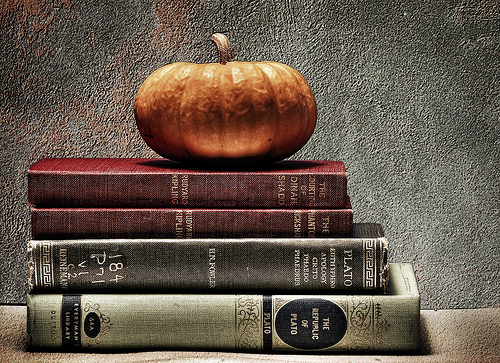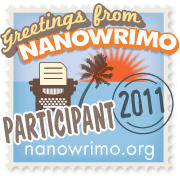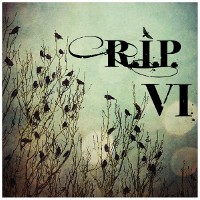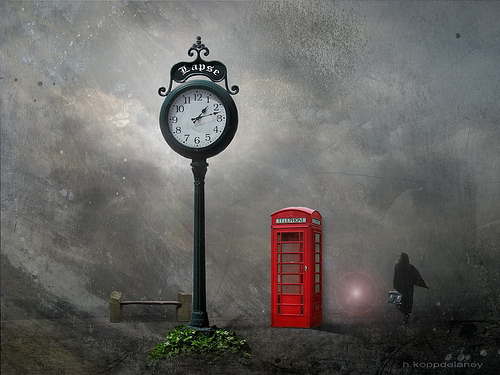No, Shelf Awareness isn’t interviewing me, but I love to read their author interviews, and they always ask the same questions (at least in my limited observation). They’re fun questions, too. So should Shelf Awareness ever want to interview me, they can simply copy and paste.
On your nightstand now:
I actually have a stack of books against the wall more than a pile on the nightstand. In my stack are [amazon_link id=”0451169522″ target=”_blank” ]Misery[/amazon_link] by Stephen King, a few Sharyn McCrumbs I want to get to, [amazon_link id=”0711231893″ target=”_blank” ]Tea with Jane Austen[/amazon_link], [amazon_link id=”B001P3OLEM” target=”_blank” ]Burning Bright[/amazon_link] by Tracy Chevalier, [amazon_link id=”0060791586″ target=”_blank” ]The Widow’s War[/amazon_link] by Sally Gunning, [amazon_link id=”0312304358″ target=”_blank” ]Moloka’i[/amazon_link] by Alan Brennert, [amazon_link id=”0679781587″ target=”_blank” ]Memoirs of a Geisha[/amazon_link] by Arthur Golden, and [amazon_link id=”0152053107″ target=”_blank” ]A Northern Light[/amazon_link] by Jennifer Donnelly, among other books I dip into occasionally.
Favorite book when you were a child:
When I was in the third grade, it was [amazon_link id=”0142408808″ target=”_blank” ]Superfudge[/amazon_link] by Judy Blume because Mrs. Elliott read it to us, and it was impossible to check out of the library for months afterward. I also loved [amazon_link id=”0807508527″ target=”_blank” ]The Boxcar Children[/amazon_link] by Gertrude Chandler Warner. When I was a little older, [amazon_link id=”0385739893″ target=”_blank” ]Tiger Eyes[/amazon_link] by Judy Blume.
Your top five authors:
- J. K. Rowling: Her books are pure, imaginative escapism, and I am grateful for all the time I’ve spent at Hogwarts.
- Jane Austen: She is my literary comfort food. I can always turn to her for a good read.
- William Shakespeare: Unqualified genius and master of the English language.
- F. Scott Fitzgerald: Beautiful turns of phrase and poetic writing. I admit his place here rests on one book—[amazon_link id=”0743273567″ target=”_blank” ]The Great Gatsby[/amazon_link].
- Barbara Kingsolver: I so enjoyed [amazon_link id=”0061577073″ target=”_blank” ]The Poisonwood Bible[/amazon_link], and [amazon_link id=”0061765228″ target=”_blank” ]The Bean Trees[/amazon_link] is one of the few books I’ve read in one sitting.
I should note that list fluctuates, but it’s true for today.
Book you’ve faked reading:
[amazon_link id=”1461120292″ target=”_blank” ]The Red Badge of Courage[/amazon_link] by Stephen Crane. I’ve still never finished it. I read the Cliff’s Notes for a test in American Realism and Naturalism in college, and I earned a B on it. If I’d read it, I could probably have earned an A, but that’s the way it is.
Book you’re an evangelist for:
The Poisonwood Bible by Barbara Kingsolver. I think everyone should read it, even if they don’t think they’re interested in Africa. What Kingsolver did with that book amazes me, and it’s the kind of writing I aspire to.
Book you’ve bought for the cover:
I’ve talked about this before, but I bought Alice Hoffman’s [amazon_link id=”0345455932″ target=”_blank” ]Blackbird House[/amazon_link] because I liked the cover, and it didn’t pay off. However, [amazon_link id=”0743298039″ target=”_blank” ]The Thirteenth Tale[/amazon_link] by Diane Setterfield and [amazon_link id=”B003WUYROK” target=”_blank” ]The Physick Book of Deliverance Dane[/amazon_link] by Katherine Howe, both of which I bought for their covers, paid off beautifully.
Book that changed your life:
This is a hard one, but I’m going with Harper Lee’s [amazon_link id=”0061743526″ target=”_blank” ]To Kill a Mockingbird[/amazon_link]. I never get tired of that book. It helped me look at my own beliefs and made me question what I would do if I were Atticus. Would I have the guts to do the right thing in the face of so much prejudice and opposition in the town, especially knowing I was licked before I began? The reason that Atticus is such a hero is that he did all this and so few people would.
Favorite line from a book:
The last page of The Great Gatsby is beautiful:
And as the moon rose higher the inessential houses began to melt away until gradually I became aware of the old island here that flowered once for Dutch sailors’ eyes—a fresh, green breast of the new world. Its vanished trees, the trees that had made way for Gatsby’s house, had once pandered in whispers to the last and greatest of all human dreams; for a transitory enchanted moment man must have held his breath in the presence of this continent, compelled into an aesthetic contemplation he neither understood nor desired, face to face for the last time in history with something commensurate to his capacity for wonder.
And as I sat there, brooding on the unknown world, I thought of Gatsby’s wonder when he first picked out the green light at the end of Daisy’s dock. He had come a long way to this blue lawn and his dream must have seemed so close that he could hardly fail to grasp it. He did not know that it was already behind him, somewhere back in the vast obscurity beyond the city, where the dark fields of the republic rolled on under the night.
Gatsby believed in the green light, the orgastic future that year by year recedes before us. It eluded us then, but that’s no matter—tomorrow we will run raster, stretch out our arms farther… And one fine morning—
So we beat on, boats against the current, borne back ceaselessly into the past.
I never tired of The Great Gatsby, and that page contains so much gorgeous writing.
Book you most want to read again for the first time:
Oh, surely the [amazon_link id=”0545162076″ target=”_blank” ]Harry Potter[/amazon_link] series. The wonder and waiting for the plot to unfold was one of the best reading experiences of my life.
photo credit: chefranden


















